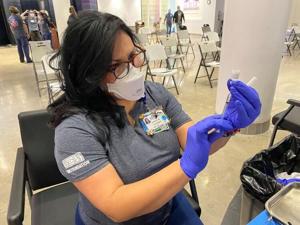At 96 years old, Betty Parker is weary of conversations dominated by ailments and complaints. Instead, she fills her journal with the joys of life: picking roses from her garden, reading, playing cards with her friends, and baking pies for gatherings. Although she concedes that her pie-baking days might be behind her, she remains committed to a life filled with purpose and connection—an achievement many struggle to attain regardless of age.
According to California-based gerontologist Dr. Kerry Burnight, who is also Parker’s daughter, while healthy behaviors such as nutritious eating and strength training are crucial for longevity, addressing loneliness and social isolation is equally important for not just living longer, but living better. “Life expectancy generally has improved in the last generation. But we want to make sure that individuals are living good years, as opposed to just living longer,” said Dr. John Batsis, a geriatrician and associate professor at UNC’s School of Medicine and Gillings School of Global Public Health in Chapel Hill, North Carolina.
The Four Pillars of a Joyful Life
Dr. Burnight identifies four key factors for deriving joy from extended, healthier years: growing, connecting, adapting, and giving. Just as one can exercise daily to maintain physical health, she suggests that individuals can strengthen their internal resilience to enhance connections and find purpose.
Her insights are not just theoretical. Dr. Burnight, her husband Todd, and her mother Betty, exemplify these principles in their own lives, often spending time together at family celebrations.
Start Whenever You Can
It’s never too early or too late to create a fulfilling life. For those yet to retire, Dr. Batsis advises planning for post-work life. “The retirement cliff, so to speak, is very difficult for individuals who have been working a lifetime,” he noted. The sudden loss of routine and purpose can be jarring without a plan. He recommends exploring hobbies and activities that might become central in retirement.
For those already retired, there are ample opportunities to discover new passions. Dr. Burnight encourages pursuing long-held dreams, such as writing a book, regardless of age. “It’s not too late at all. In fact, it’s the perfect time to really lean into and redefine it,” she said, referencing her upcoming book, “Joyspan: The Art and Science of Thriving in Life’s Second Half.”
Continuous Growth and Adaptation
Engaging in challenging activities is vital for cognitive sharpness and enjoyment in later years. “New experiences activate neuroplasticity … that is our brain’s ability to keep growing,” Dr. Burnight explained. Routine activities might not foster growth, but new challenges can.
Dr. Batsis shared the story of a patient who took up golf and guitar after retirement, opening new social and cultural avenues. He emphasizes choosing activities that are genuinely enjoyable, as personal interest is a strong motivator.
For caregivers, Dr. Burnight advises against doing tasks for loved ones that they can manage themselves, as overcoming challenges is crucial for personal growth.
Diversifying Social Connections
Betty Parker exemplifies the importance of a varied social circle. She regularly plays canasta with “the youngs,” a group of women in their 60s, highlighting the value of friendships across different ages. “Like how we diversify our financial portfolio, socially we want to have friends of different ages, friends from your neighborhood, as well as friends from the past,” she said.
Dr. Burnight suggests using social media to reconnect with old friends and emphasizes the significance of small interactions in building meaningful relationships. Her core advice is to take the initiative in friendships, as loneliness can adversely affect longevity.
Finding Joy and Purpose
While Parker enjoys her 90s, adaptation has been necessary. She had to give up tennis and now occasionally uses a walker. However, these changes haven’t hindered her from enjoying family time, gardening, or participating in local parades.
Dr. Burnight stresses the importance of adaptability in aging well. “We are always going to have changing circumstances, and growing older brings a lot of challenge,” she said. Embracing change rather than denying it is critical for aging gracefully.
Research supports the idea that attitudes towards aging significantly impact the aging process. “People who believe that aging is a time of continued growth live 7.5 years longer than those who think, ‘Oh, I’m old. I’m going to retire and just go knit with the ladies,'” Burnight said. She encourages focusing on the ability to give, as giving correlates with higher levels of joy and longevity.
Starting small is key. Simple acts of kindness, like sharing produce from your garden or helping a neighbor, can provide a sense of purpose. “Purpose is small and daily and a decision,” Dr. Burnight concluded. “It’s saying, ‘Okay, today, how am I going to use the fact that I’m alive and that I have things to give?’”
For more insights on living well, consider signing up for newsletters that provide tools and information to enhance well-being.
































































